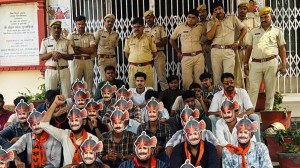Who was E V Chinnaiah, lead petitioner in Supreme Court’s SC sub-classification case?
Sole surviving petitioner of 2004 case, Mallella Venkat Rao, says court verdict disappointing, will file review, "will lead to bad blood among sub-castes"
 “I am a bit disappointed by the SC verdict,” said Rao, the sole surviving petitioner. (File)
“I am a bit disappointed by the SC verdict,” said Rao, the sole surviving petitioner. (File)Hours after the Supreme Court on Thursday allowed the sub-classification of Scheduled Castes (SCs) and Scheduled Tribes (STs) by overturning its 2004 judgment in the E V Chinnaiah vs State of Andhra Pradesh, Mallella Venkat Rao who was one of the three petitioners in the case said he would file a review petition in the top court. All three were from the Mala community in Andhra Pradesh, which is viewed as one of the prime beneficiaries of reservation while the Madiga SC group claims it has been left out.
“I am a bit disappointed by the SC verdict,” said Rao, the sole surviving petitioner. “Malas have not cornered all the quota benefits as it is being projected by the other sub-castes, especially Madigas. When the seven-judge Bench started proceedings they should have summoned me to hear our side but they did not do it, while the Madiga Reservation Porata Samithi (MRPS) received the summons and they were well represented. We were against the classification of SC castes because it is a myth that Malas corner everything from the six per cent SC quota. We believe Dalits should be given their due from the quota based on merit, that is why we oppose the classification. I will file a review.”
In June 1997, after the MRPS organised a marathon rally from N Chandrababu Naidu’s birthplace Naravaripalle in Chittoor district to Hyderabad, Naidu, then the Andhra Pradesh Chief Minister, agreed to divide the SCs into the A, B, C, and D categories. This is when E V Chinnaiah, Venkat Rao, and Mala Mahanadu founder P Vigneshwara Rao challenged the Naidu government’s order in the Andhra Pradesh High Court. A single-judge Bench of the court struck down the order but the Naidu government passed an Ordinance and then an Act in the Assembly and the High Court upheld the legislation. In 2001, the three activists approached the Supreme Court against the law, with Chinnaiah as the lead petitioner. A five-judge Constitution Bench ruled in November 2004 that micro-classification of SCs was unconstitutional. The verdict came just when Y S Rajashekara Reddy of the Congress came to power, dislodging Naidu. In 2011, the petitioners on behalf of Punjab’s Balmikis and Mazhabi Sikhs filed a petition in the SC against the Punjab High Court’s ruling.
The case of Punjab’s Balmikis and Mazhabi Sikhs came to the Supreme Court after the Punjab and Haryana High Court in 2006 struck down 50% quota for them among the seats reserved for SCs, citing the Chinnaiah judgment. It was then that Venkat Rao, Vigneshwara Rao, and Chinnaiah were impleaded as petitioners in the case.
E V Chinnaiah’s life
Venkat Rao, Vigneshwara Rao, and Chinnaiah became active in Dalit politics in the 1980s and 1990s. They first met in the aftermath of the July 1985 massacre of Madiga Dalits in Karamchedu in Andhra Pradesh. They also visited Tsunduru in Bapatla district after Dalits from the Mala community were massacred in August 1991.
Chinnaiah was an Ambedkarite and Buddhist from Nellore who settled down in Hyderabad, working as a Class IV government employee. He retired in the 1990s and did odd jobs to earn money from book translations. “In the 1990s, we were not very organised or politically active, we were not highly educated, but we did what we felt was right,” said Venkat Raom adding that Chinnaiah spent several years translating Dr B R Ambedkar’s works The Buddha and His Dhamma and Annihilation of Caste into Telugu. In November 2005, a year after the Supreme Court judgment in the case bearing his name, Chinnaiah died. He was 68 years old at the time. A month later, Vigneshwara Rao, who was a Class I officer in the Andhra government’s Information Department, died of a heart attack while visiting Delhi to discuss the issue with political leaders, Veknat Rao said. He was 56.
Venkat Rao said since 2000 he has been a full-time Dalit activist. “I have immersed myself in the work of upliftment of Dalits and fighting against classification. I feel that it is being done for political benefit but it will not help the Dalits in any way. Classification will also lead to bad blood among the different sub-castes. I will continue to fight against it,’’ he said.
- 01
- 02
- 03
- 04
- 05































